The Four Basic Parenting Styles Taken a Step Further:
- Reviewing Diana Baumrind's Model with the Tool of High Awareness
My aim in this article is not to go into descriptive depth of the four basic parenting styles. Therefore you'll only get a very, very brief description of Baumrind's 3 parenting styles (a fourth one was added later by Maccoby and Martin).
If you wish to read more about each one of Baumrind's 3 parenting styles, their presumed effect on children and a more elaborate introduction into Baumrind's anaytical tools of demandingness & responsiveness, you may want to read this article on the 3 parenting styles first.
In that article on parenting styles, you'll get a presentation of each parenting style at full length.
This article, on the other hand, will take 'meta' perspective on Baumrind's 3 parenting styles and go into analytical depth.
Taking point of departure in recent, insightful academic comments on Baumrind's theories, I wish to take her model a step further.
But first, let's go to the quick description of the four basic parenting styles.
A Visual Model of the Parenting Styles
In the 1960s Diana Baumrind formulated 3 parenting styles based on an extensive long term study.In my visual model below you can see how the four basic parenting styles (neglectful parenting styles included) are placed according to Baumrind's two factor continuum of high demandingness vs. low demandingness and high responsiveness vs. low responsiveness.
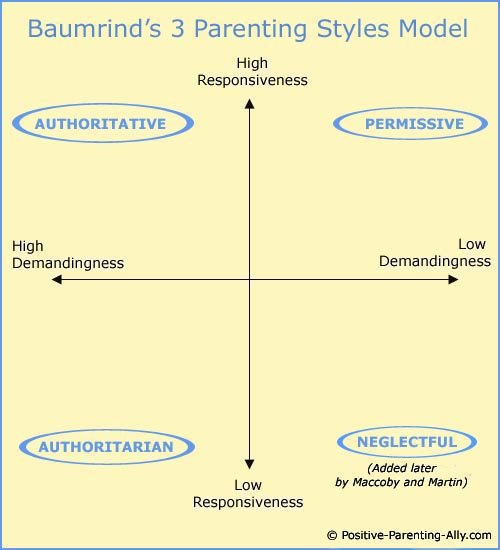
A Quick Peek at the Four Basic Parenting Styles as Diana Baumrind Sees Them

The Authoritarian Parenting Style:
Authoritarian parents are characterized by needing to keep their children in a short leash and enforce many rules that are to be obeyed without question.
Misbehavior is not tolerated and authoritarian parents may typically resort to punishment as a way to control their kids' behavior.
The authoritarian parents have very high expectations of their kids' maturity and expect their kids to live up to high standards of 'proper' behavior.
Diana Baumrind's View on the Authoritarian Parenting Style:
Too strict: Authoritarian parents have high demandingness / control (a good thing according to Baumrind) but low reponsiveness (not so good in her view).The Permissive Parenting Style:
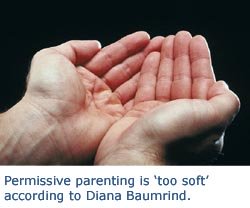 Permissive parents form a direct contrast to the authoritarian parents. They strongly believe in the autonomy of the individual and that kids' should be treated as equals.
Permissive parents form a direct contrast to the authoritarian parents. They strongly believe in the autonomy of the individual and that kids' should be treated as equals.
Permissive parents impose very few rules on their kids and the kids are typically included in decision making processes.
Diana Baumrind's View on the Permissive Parenting Style:
Too soft: Permissive parents have low demandingness / control (not a good thing according to Baumrind) but high reponsiveness (good in her view).The Authoritative Parenting Style:
 Authoritative parents may be seen as a mix of the two above parenting styles.
Authoritative parents may be seen as a mix of the two above parenting styles.
They are assertive and have clear standards of behavior for their children. At the same time they also try to be supportive and understanding their children's point of view.
In this way they strive to balance their children's need for autonomy with their own need for control.
Diana Baumrind's View on the Authoritative Parenting Style:
Perfect: Permissive parents have high demandingness / control (a good thing according to Baumrind) and high reponsiveness (also good in her view).The Neglectful Parenting Style:
The neglectful parenting style or uninvolved parenting style was formulated later by Maccoby and Martin.The uninvolved parents fulfil their children's physical needs but are otherwise distant, detached, and disengaged. They are not participating emotionally in their children's lives.
Neglectful parents have low demandingness / control and low repsponsiveness / warmth.
That was the quick description of the four parenting styles. Let now take a 'meta' look at Baumrind's theories!
We're All Biased: Baumrind, Too!
As an anthropologist I'm taught to be aware of the fact that all research is biased, culturally as well as personally.Analytical and scientific measuring tools are always a product of a specific culture at a specific time. And in my opinion one can never really escape a personal bias either, especially not in social research.
As we know, Baumrind was conducting her research in the early 1960s and I think it's important to keep this time factor in mind. Society and values were very different back then.
Whether scientists want to or not they typically end up weaving integrated, habitual societal values into their research as analytical premises. It's very difficult not to!
This reasoning obviously entail that I'm biased, too. I will not pretend not to be. That would be a lie!
I'm also a product of time and place and I have my personal opinions.
So this article will both reflect my position as an anthropologist (questioning presumptions and norms) as well as that of being a mother (drawing on personal experience and using my 'maternal' intuition).
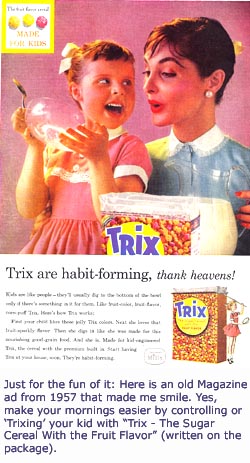 The Time Factor:
The Time Factor:
- Baumrind Was Insightful but Nonetheless Still a Product of Her Era!
As I mentioned before, Diana Baumrind's study took place in the in the early 1960's.
This means that societal values and behavioral norms were somewhat different than those we have today.
Today we tend to say that in the West we have an individualistic or liberalistic orientated society - a general belief in individual freedom and an encouragement of independence and self-reliance.
In the 1960s the old 'Victorian' values (high control, stricter morals, rigid rules) of the authoritarian parenting style were slowly making way to a somewhat more relaxed parenting style, namely the authoritative parenting style (still high in control but also high in responsiveness as well).
 The high responsiveness may be an effect of the slow emergence of a more individualistic society.
The high responsiveness may be an effect of the slow emergence of a more individualistic society.
Therefore in the 1960s a focus on 'the individual' is slowly starting to become recognized.
However, people were still seen as having a main obligation (before anything else) towards fitting into and upholding greater social structures (like the family as a structural constellation and society).
You can see Baumrind's preference for 'social' values (vs. individual values) in the way that she defines control as:
- "the claims parents make on children to become integrated into the family whole, by their maturity demands, supervision, disciplinary efforts and willingness to confront the child who disobeys." (Baumrind, 1991).
This presumption of the necessity of high control may affect the very analytical premises of her study.
Baumrind seems to assume that the role of the parent is that of controlling their children - more about this now:
Academic Criticism of Baumrind's Celebration of Control
One of the main academic objections to Baumrind's results is her presumption that strong control (with a loving hand) is one of the most important things of good parenthood.In her work "The Psychology of Parental Control: How Well-Meant Parenting Backfires", psychologist Wendy S Grolnick, argues that Baumrind puts too much weight on the consistent practice of tight control and too little on the context, the situation.
The consequence of this focus, Grolnick argues, is an overruling of the child's specific contextual needs: such as the need for autonomy, motivation and self-determination.
In much the same vein developmental psychologist Stephen Greenspan addresses Baumrind's control issue as inflexible and lacking situational dexterity.
Stephen Greenspan says:
- "To my mind, the major problem with Baumrind’s model of parenting is that it lacks any overt recognition that competent parents, even ones who are relatively high on control, need to make judgments all the time about when to intervene and when to not intervene. (...) Good parenting involves the ability to make effective decisions under the pressure of sometimes difficult and confusing situations. The technique of authoritative parenting is too static and rigid to allow effective and flexible management of such complexity."(Greenspan, 2006)
In this way Greenspan perceive Baumrind's model to be too static as different situations require different reactions / answers.
The Mysterious Harmonious Parents That Couldn't be Categorized
 In her study Baumrind found a small subgroup of parents that she couldn't really place.
In her study Baumrind found a small subgroup of parents that she couldn't really place.
Baumrind didn't observe them using overt discipline or control with their children but still the children were happy and thriving.
She noticed these parents because they didn't fit her predefined control categories. Her assistants couldn't categorize them or 'box' them as the parents seemed to have control over their kids but never seemed to have to display it.
Baumrind called these parents 'harmonious' parents (reference).
The Expanded Greenspan Theory:
- Introducing "Tolerance" as Measuring Instrument and Replacing Authoritative Parents with Harmonious Parents
Stephen Greenspan argues for a model of the parenting styles that replaces the authoritative parenting styles with a harmonious parenting style.
He argues that good parenting skills are also about judging what is needed at the moment: Sometimes we need to enforce rules and sometime we need to lay off.
Therefore he wants to replace Diana Baumrind's two factor model (control & responsiveness) with a three factor model including what he terms "tolerance":
- "The harmonious pattern can, therefore, be defined as characteristic of parents who are warm, who set limits when they feel it is called for, and who overlook some (presumably mild) child behaviors in the interests of facilitating child autonomy and of maintaining family harmony." (Greenspan, 2006)
Below you'll see a model of mine where I've tried to place the four basic parenting styles along with the harmonious parenting style according to Greenspan's concept of "tolerance".
See explanation below the model:
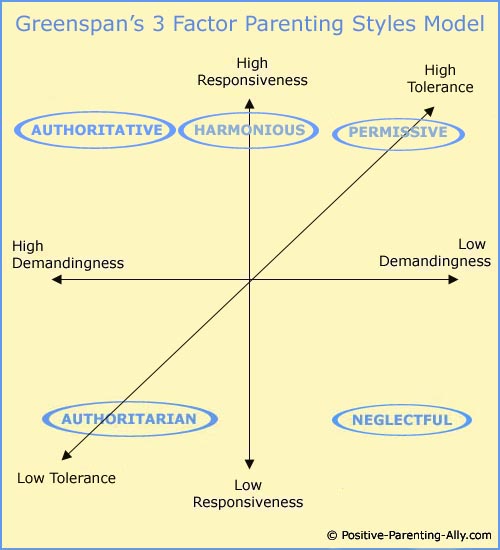
Greenspan says that harmonious parent's have "high warmth, moderate control, high tolerance".
However, if we are to place his idea of harmonious parents into the model which also includes permissive parents (who must be presumed to have an even higher tolerance level) harmonious parents who "set limits when it is called for and overlook some (presumably mild) child behaviors" must then according to my logic have 'moderately' high tolerance level, hence permissive parenting scoring higher on tolerance.
So according to my logic, in the model we have:
- The authoritarian parenting style: high demandingness, low responsiveness, low tolerance.
- The permissive parenting style: low demandingness, high responsiveness, high tolerance.
- The authoritative parenting style: high demandingness, high responsiveness, low tolerance.
- The neglectful parenting style: low demandingness, low responsiveness, low tolerance
The harmonious parenting style: moderate demandingness, high responsiveness, moderately high tolerance.
Time for Another New Model:
- Replacing the External Behavior Focus With an Inner Awareness Focus!
Now, as I've already mentioned, no one is unbiased.
When making our theories most of us have conscious or subconscious agendas that we like to see fitting nicely into our models. This goes for me as well.
So, as well as being a mother who has personal opinions and experiences, I'm also a cultural 'product' of a certain time and place.
If you are familiar with my parenting articles you'll know that in my parenting style I reflect the more liberalistic and individualistic tendency in today's Western society.
I'm not very keen on following norms just because they are there and I'm not very focused on my child's behavior as such but much more occupied with what it reflects: a need! My focus is clearly: What's going on inside my child and how can I help empower him!
If we quickly return to Stephen Greenspan - who I think really hit the nail on the head by pointing out that Diana Baumrind's much celebrated authoritative parenting style is too rigid and does nor account for a necessary contextual flexibility - I'd like to try and further expand the four parenting styles framework.
What Baumrind's and Greenspan's models of the four basic parenting styles do have in common is a focus on external behavior, on actions.
This is fine but to me as a parent, the explicit focus on behavior is secondary - it's a result of a level of awareness: Sensing what is needed at the moment with an eye for the long term effects.
To me the concept of high awareness encompasses what I think is relevant. High awareness includes flexibility (or Greenspan's tolerance) but also deep presence, holistic thinking, using intuition etc.
Therefore I will not use the concept of tolerance. It might do well academically in order to make the behavior model complete. However, the tolerance focus is still on external behavior: when is behavior tolerated and when is it not and that is too narrow for me as a parent!
Also I'm not even interested in the control or discipline aspect because the more (in my opinion) control a parent uses or resorts to, the lower the awareness level. In my experience control is not needed when awareness (presence, tuning in, bonding etc.) is high.
A Parenting Styles Model for Parents!
So as you may have guessed, I'm suggesting yet another model which I think might be more relevant for parents as it goes beyond mere behavior.The premises of my model are not 'scientific'. They are based my interpretation of data, personal knowledge and gut feeling, so you may agree with me or not. Your choice!
My model have two axes: high awarenss vs. low awareness and social system focus (norms) vs. individual focus (needs). I'll explain more below the model.
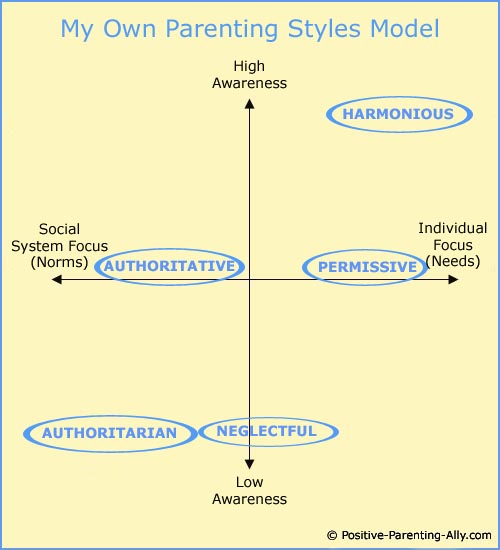
The Harmonious Parenting Style
(As it may be understood in my parenting styles model)
In my view harmonious parents must score high on awareness and high on individual focus.
They tune in on their kids to find out what they need. They use their high level of awareness to find a way to meet the need (a need may be acceptance, understanding, respect, autonomy etc. which will be more important for the harmonious parents to meet than following established norms and rules).
Harmonious parents strive towards meeting their children's needs as quickly as possible (short term focus) but in a way that paves the road for an optimal, free growth into caring, conscious individuals (long term focus).
In my opinion the art of meeting needs as quickly as possible (short term) in a way that is truly beneficial for both parents and children long term is what really separates high conscious parents from low conscious parents:
An ability to fully be in the 'Now' with an eye for the long term perspective.
The Authoritative Parenting Style
(As it may be understood in my parenting styles model)
Most people might say that the authoritative parenting style should be in the middle of social vs. individual continuum.
However, in my opinion Baumrind's focus on high control is present and therefore drags them toward the social system focus.
Authoritative parents are responsive and understanding of their kids but in the end, they will still keep high control by letting predefined rules of conduct, societal norms and consensus values determine the end outcome of their decision. Hence, Stephen Greenspan's 'inflexibility'!
The Permissive Parenting Style
(As it may be understood in my parenting styles model)
Permissive parents are obviously placed far out to the right. Their focus is on the individual and they try to meet all their kids' needs irrelevant of what society 'says'!
However, one thing they may lack is the ability to distinguish between what a child wants and what a child needs.
A child may say that he or she wants a new toy, but maybe that is not what the child really needs.
Or a child is acting out because he or she won't go to bed. Permissive parents might think that their child should be allowed to stay up late as he or she seems to have lots of energy. However, what their kid really needs is to sleep. The acting out and using energy may just be a desperate attempt to stay awake. In this way they lack the long term focus of high awareness.
The Authoritarian Parenting Style
(As it may be understood in my parenting styles model)
In my view authoritarian parents are a more extreme, controlled version of authoritative parents.
They are very 'bound' by rules and norms but do not make space for their child to have a voice in the same way as authoritative parents do.
The Neglectful Parenting Style
(As it may be understood in my parenting styles model)
Obviously neglectful parents are low on awareness. I put them in between individual and social, not because they really are in between but because I can't really 'measure' them as they lack any involvement with their children.
My Last Comments:
- Why I Emphasize High Awareness!
My aim has not been to try to make another 'scientific' model or another 'social' theory - I'm not trying to be objective. I have personal opinions and I let them show in my model of the four basic parenting styles!
My aim has been to make a model that I think might make more sense to conscious parents who while raising children are also on a personal journey of personal development.
This is another reason why I place so much emphasis on high awareness. High awareness is in my view one of - if not the - most important parenting skill.
Your Positive Parenting Ally,
Birgitte

Want to stay in touch and get the latest news?
Sign up
for my free newsletter
Parent Coaching
- For Inner Peace, Clarity and a Deeper Connection to Your Child
 Being a parent can feel like a double-edged sword. Life with kids may feel like the greatest gift you have ever received, while at the same being hugely challenging, often leaving you confused, stressed and overwhelmed.
Being a parent can feel like a double-edged sword. Life with kids may feel like the greatest gift you have ever received, while at the same being hugely challenging, often leaving you confused, stressed and overwhelmed.
When we feel like this, we've lost touch with ourselves. We can't hear our own inner voice, and it's difficult to know what is 'right' for us and how to act.
I offer in-depth parent coaching to help you regain your balance and get back in touch with yourself. From a place of inner peace and clarity, your will find your own answers which will help you reconnect with your child from a place of unconditional love and acceptance.
Read more about my parent coaching here.
Where Would You Like to Go Next?
Go to the 'Mother Page' of These Parenting Articles
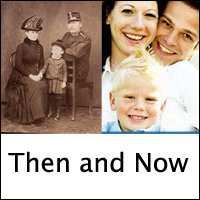 Tracing Diana Baumrind's Parenting Styles Through History! Unravelling the Essence of the Dominant Parenting Paradigms of the Western World |
Article on Diana Baumrind's Parenting Styles
 Diana Baumrind's 3 Styles of Parenting: Get a Full Understanding of Baumrind's 3 Archetypical Parents. |
Articles on the Authoritarian Parenting Style
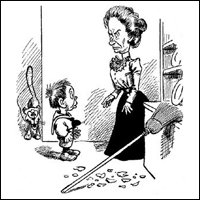 A Fascinating Historical View on the Authoritarian Parenting Style Along with Deep Insights into Authoritarian Parents' Thought Pattern and Its Effect on Their Kids. |
 A Psychological Profile on Authoritarian Parents! Understanding the Authoritarian Personality from Within! |
 The Essence of the Authoritarian Parenting Style and the Long Term Effects of Strict Parenting! |
Articles on the Permissive Parenting Style
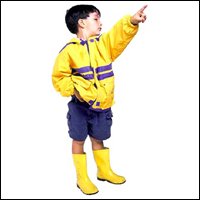 The Permissive Parenting Style Seen in an Existential Light. The Beingness of Permissive Parenting vs. the Beingness of Positive, Unconditional Parenting! |
 Understanding the nature of the permissive parenting style: Going beyond Diana Baumrind's idea of low demandingness and get deep insights into the psychology of permissive parents. |
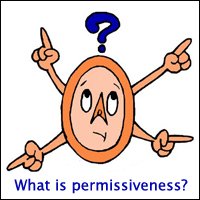 Permissive Parenting Historically and Psychologically: The Rise of 'Permissive' Parenting and the 3 Fear Based Indulgent Parenting Strategies! |
 A Psychological Profile on 3 Types of Permissive Parents: Understand Their Indulgent Behavior by Understanding Their Ego Fears! |
Articles on the Authoritative Parenting Style
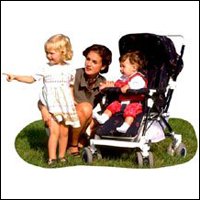 Deep Insights into the Authoritative Parenting Style along with Modern Perspectives on Diana Baumrind's Beloved 'Firm Parental Control'! |
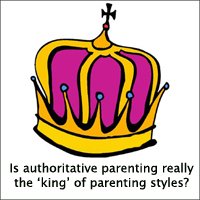 Academic Criticism of the Authoritative Parenting Style: Questioning Diana Baumrind's Celebration of High Control! |
Back to the top of this page about The Four Basic Parenting Styles Taken a Step Further: Reviewing Diana Baumrind's Model with the Tool of High Awareness
Go to the Positive Parenting Ally Homepage







